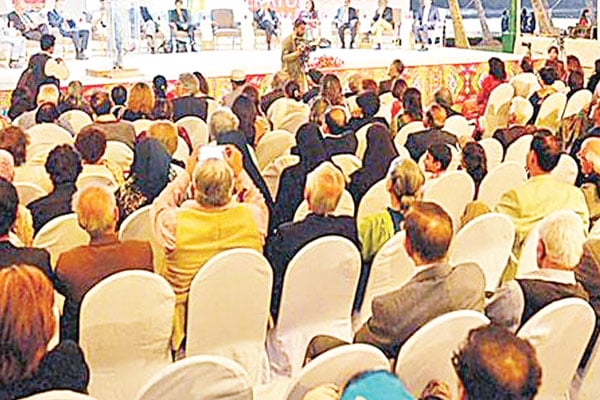Since the rebirth of Pakistani cinema (after several decades of predominantly commercial Lollywood films), there has been a steady stream of commentary that has divided cinema into two categories: (a) commercial films that make moolah on the box office and (b) critically acclaimed movies that lack box office pull.
A diverse group of industry experts, such as filmmaker Farjad Nabi, actors Nimra Bucha and Sania Saeed, discuss the challenges that face Pakistani cinema as it learns to carve a unique identity for itself.
InstepOverVIEW
Industry experts weigh in on the future of cinema and the importance of telling intelligent stories.
Karachi
Since the rebirth of Pakistani cinema (after several decades of predominantly commercial Lollywood films), there has been a steady stream of commentary that has divided cinema into two categories: (a) commercial films that make moolah on the box office and (b) critically acclaimed movies that lack box office pull.
All this has led to a debate on whether our filmmakers should mainly focus on making money or concentrate on giving viewers intelligent stories instead. And as the revival of cinema gains momentum (with the number of film releases increasing each year), there are now more opportunities to expose people to diverse Pakistani content.
All these questions about the future of cinema took center-stage at the recently concluded seventh edition of Karachi Literature Festival where an interactive session, Pakistani Cinema Strikes Back, shed light on these issues and more. Dedicated to the challenges that affect Pakistani cinema, the panel featured a diverse group of industry experts such as Nadeem Mandviwalla (of Mandviwalla Entertainment), Hashim Raza (CEO Cinepax Cinemas), actors Nimra Bucha and Sania Saeed and filmmaker Farjad Nabi.
Nadeem Mandviwalla spoke about changes in government policies (first in 2001 and then again in 2007) as well as the contribution of Indian cinema in bringing back the culture of going to the movies. “The humungous gap that we observe between old and new cinema is because we never went through an evolution process; we stopped in the ’70s and restarted in 2007,” Mandviwalla noted.
Hashim Raza, CEO Cinepax Cinemas, meanwhile reflected on the growth of cinema with 2015 serving as a particularly productive period. “From 2012 to 2015, the Pakistani film industry has grown exceptionally well and more than 25 per cent of the movies that were made in the year 2015 were productive,” Raza shared.
The conversation touched upon several issues that prevent the industry from progressing, one major issue being quality or its inconsistency. Raza rightfully observed that without powerful stories, success would be hard to find. “We need passionate filmmakers back in the industry,” Raza noted and continued, “without thinking if this movie is essentially going to be financially profitable or not, we need them just to make quality films. They [films] don’t necessarily have to be masala movies to make it to the big screen.”
“Films like Manto, Shah, and Moor were not necessarily profitable but they actually added to the quality of Pakistani cinema. They addressed some key Pakistani issues which were really important to the cause,” he added.
Veteran actor Sania Saeed, who was also seen in Sarmad Khoosat’s Manto as his wife Safia, observed that the stories we tell should focus on our own traditions. “It is very important to tell our own stories, reflecting our own customs and traditions.”
Sania also emphasized on the fact that our people want to see all sorts of stories – be it masala movies or stories with intelligent discourse on offer. “Manto may not have been commercially successful, but the kind of response Moor and Manto received, it is unprecedented,” she added.
Television and theater actor, Nimra Bucha, who was last seen in Asim Raza’s Ho Mann Jahaan, remarked that the success of a film is essentially because of its storyline. Talking about HMJ during the session, Bucha said, “Ho Mann Jahaan is one of the first stories which is about us; our own story, in our own words, our own music, and in our own way. It is about family [and] about a culture which is not a dead culture.”
Filmmaker Farjad Nabi (who co-directed Zinda Bhaag) observing the inextricable link between finance and story stated, “Those who have stories do not have finance, while those who have finance they don’t have stories.” We’re looking for the balance.